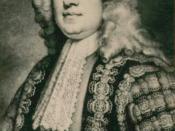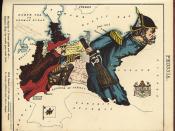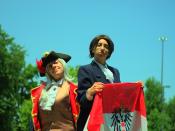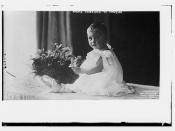Balance of Power DBQ The fight for the balance of power in Europe following the Treaty of Utrecht escalated into global conflicts as nations, such as (1) England, (2) Prussia, (3) Russia, (4) France, continued to fight with nationalistic zeal. Frederick the Great of Prussia continued the excellence of Prussia not only by being militaristic, but also by being a connoisseur of the arts with his public performances.
The Treaty of Utrecht further separated the nations of France and Spain. France, coping with the loss of the "Sun King" in 1715, competed with Germany over the coveted lands of Alsace and Lorraine. The Treaty completed redrew the map of Europe. The treaty damaged the "mother" countries, but left their colonies unchecked. While France and Britain were competing in the New World, for land and furs, the political climate in Europe escalated into intense conflict that led to the Seven Years War in 1754.
England, under the leadership of King George I, continued its quest in dominating trade in Asia and in North America. However, the idea of the constitutional monarchy came into play in the 1720's with Parliamentary leader Sir Robert Walpole. Walpole was declared the first head of the cabinet, or prime minister, of Great Britain. With the real power of the British government behind his helm, Walpole dictated foreign policy until his successor, Sir George Grenville, took over in 1750's. The Cabinet controlled England until the reign of King George III. George III tried to restore the power of the king, but after the "unsuccessful" bid in America, his inability to rule proved otherwise Prussia, ruled by the domineering Frederick the Great, continued in militaristic campaign in the East by capturing key sections of the nation of Poland. Poland was sectioned by Russia and Prussia. Frederick was also a connoisseur of the arts. He enjoyed playing the flute with his orchestra in public.
Russia, after suffering drawbacks under Ivan IV, gained notoriety in rule of Peter the Great. Peter the Great's attempt at the Baltic seaport, led to the Great Northern War between Russia and France. The classic battle of Poltava was the turning point of this war. The Russians won and gained a foothold on the Gulf of Finland with the new city of Saint Petersburg. With the accession of Catherine the Great to the Russian throne, the emancipation of the nobility began France, still recovering from the loss of the "Sun King" in 1715, continued to coerce with Germany over the coveted lands of Alsace and Lorraine. France witnessed the internal struggle that led to the overthrow of the monarchy and the French Revolution.
The balance of power struggle that engulfed Europe was a presupposition that all nations needed to get along in order to have peace. With the English dominating trade, the possible outbreak of war was inevitable. It occurred in 1754 with the Seven Years War, and the American Revolution in 1775.





